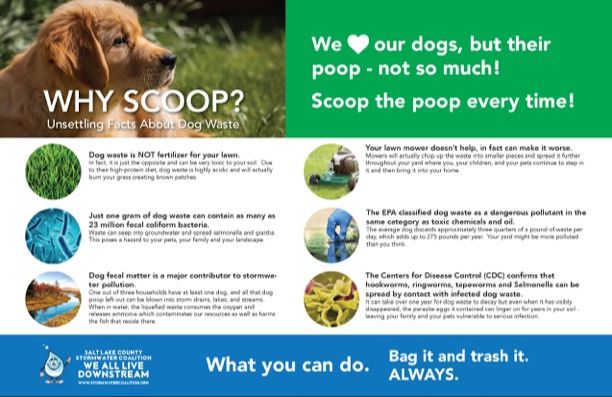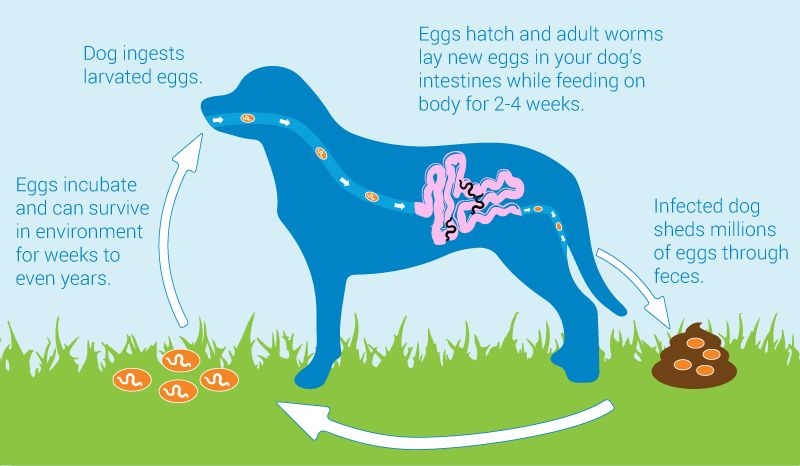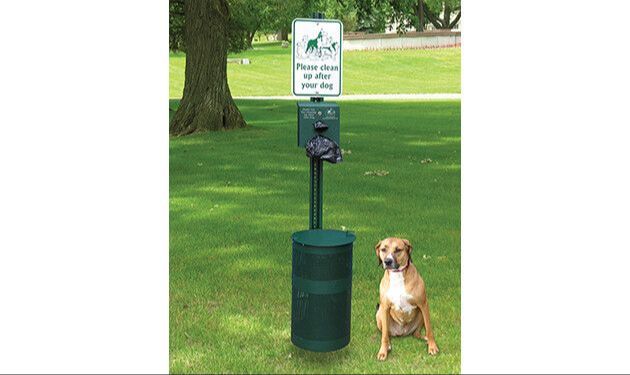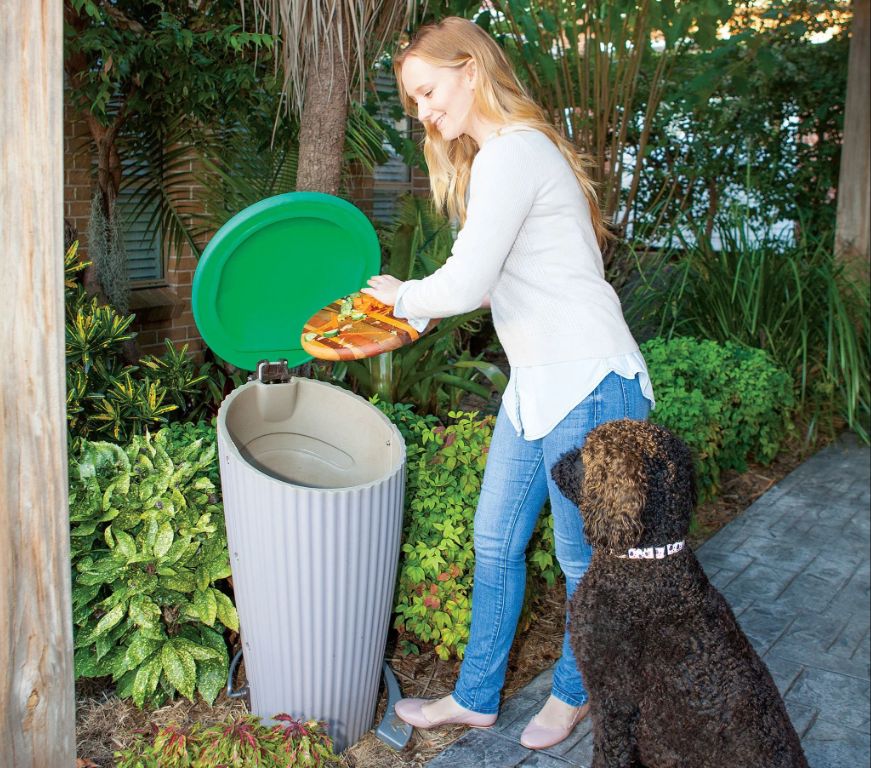Introduction
Researchers estimate that in Calgary parks alone, about 127 grams of dog feces per hectare are left behind each week, equaling over 150 piles of waste per hectare over a six day period. With millions of domestic dogs in cities across North America, this small individual habit leads to a huge environmental and health impact when multiplied.
Environmental Impact
Dog waste that is not properly picked up and disposed of can have major negative impacts on the environment, especially waterways and groundwater. According to the EPA, dog waste contains harmful bacteria and parasites like Giardia, Salmonella, and E. coli that can be washed into storm drains and contaminate water sources (source). Just one gram of dog waste can contain 23 million fecal coliform bacteria, which can survive in water for up to 4 months.

These pathogens from dog feces can pose risks to both human health and aquatic ecosystems. Bacteria, parasites, and nutrients like nitrogen and phosphorus get transported into lakes, rivers, oceans, and groundwater sources that are used for drinking, recreation, and irrigation. This can contribute to algae blooms, oxygen depletion, and outbreaks of illnesses like giardiasis and cryptosporidiosis that affect wildlife, pets, and people (source).
Properly disposing of dog waste prevents contamination of water and reduces public health risks. Scooping regularly, using biodegradable bags, and discarding waste properly protects local water quality for both environmental and public benefit.
Health Risks
Dog waste contains harmful bacteria, viruses, parasites, and pathogens that can spread diseases to humans through fecal contamination. According to the Rhode Island Department of Health, pet waste contains diseases such as salmonella, E. coli, giardiasis, hookworms, roundworms, whipworms, campylobacteriosis and parvovirus that can infect people (1). The EPA estimates pet waste to be as toxic as chemical and oil spills (2). These diseases spread through direct or indirect contact with dog feces.

Salmonella and E. coli can be contracted from accidentally ingesting dog waste from contaminated soil, water, or food. Giardiasis spreads through ingesting cysts shed in feces and causes diarrhea. Roundworm larvae can migrate through the skin into circulation and cause infection. The greatest risk of disease transmission comes from uncontrolled pet waste in areas like sidewalks, parks, beaches, and playgrounds. Proper disposal of dog feces can help mitigate these health hazards.
Aesthetic Issues
One of the biggest concerns with dog waste is the unsightly appearance and unpleasant odor it can create. Dog feces left on the ground can be an eyesore in parks, neighborhoods, trails, and other public spaces. As it decomposes, the waste emits an ammonia-like smell that many find offensive. According to a study from the Conway School of Landscape Design, this can detract from the aesthetic appeal and enjoyment of outdoor areas (source).
Visibly soiled areas covered with dog feces and the associated foul smells make public spaces less welcoming. It diminishes the scenic beauty and cleanliness people expect when visiting parks and trails. The accumulation of dog waste is considered a public nuisance, similar to litter or graffiti.
In addition to being visually unappealing and smelly, dog waste poses slip and fall hazards. The feces can end up on sidewalks, trails, grassy areas, and other locations where people walk. Stepping in dog poop is an unpleasant experience and increases the likelihood of slipping and injuring oneself.
Solutions

Picking up after your dog is the best solution to prevent environmental and health issues from dog waste.
According to The Guardian, some ways to encourage people to pick up after their dogs include providing free waste bags, implementing fines for not cleaning up, and using DNA tracking to identify offenders.
Having waste bags and trash cans available also makes it easier for dog owners to clean up after their pets. As The Park Catalog explains, placing dog waste stations along trails and in parks eliminates excuses for leaving waste behind.
Educating dog owners about the importance of picking up dog poop is key. Dog waste can contaminate water, spread parasites and bacteria, and contain nutrients that negatively impact the environment. Being a responsible dog owner means always cleaning up after your pet.
Legislation
Many cities and municipalities have laws requiring dog owners to clean up after their pets. These types of ordinances and regulations help keep public areas clean and prevent the spread of diseases from dog waste.
For example, in Lake County, Florida there is a county ordinance requiring pet owners to immediately remove their dog’s excrement from any property that is not their own, with violators facing fines up to $500 [1]. Many other local governments have similar “pooper scooper” laws.
These laws acknowledge that allowing dog waste to accumulate can pose public health risks. Rotting dog feces can spread parasites and bacteria, contaminating water sources or causing infections if people come into contact with it. Thus, legislation helps enforce cleaning up and proper disposal.
Proper Disposal
When disposing of dog waste, it’s important to do so in a way that is sanitary and environmentally friendly. There are a few recommended methods for properly getting rid of dog poop:
Picking it up with a plastic bag or pooper scooper and throwing it in the trash. This contains the waste and prevents it from ending up in public spaces or waterways. However, plastic bags contribute to landfill waste. PetMD recommends double bagging to prevent leaks.
Flushing unbagged waste down the toilet. This immediately transports the waste to a sewage treatment facility. However, too much dog waste can clog pipes so this method should be used sparingly. Wiser notes flushing is best for liquid and small amounts of waste.
Burying it in the yard. Digging a hole and burying waste at least 5 inches deep can decompose it naturally. This is only suitable if local ordinances allow it. Bury away from vegetable gardens and ensure it cannot contaminate water sources.
Composting in a designated dog waste composter. Special composters can decompose waste through microbial activity. Position the composter away from edible gardens and regularly maintain it.
Following local guidelines is important for sanitary and environmentally friendly disposal. With the right precautions, dog waste can be contained and eliminated properly.
Composting Dog Waste

While composting dog waste may seem like an eco-friendly way to dispose of it, there are some important risks and considerations to keep in mind. According to the AKC, dog waste can contain harmful pathogens like giardia, salmonella, and E. coli that can persist through the composting process and contaminate the finished compost (https://www.akc.org/expert-advice/lifestyle/is-dog-poop-compostable/). WebMD also warns that composting dog waste can attract pests like rodents and flies, and spread mold and fungus (https://www.webmd.com/balance/what-to-know-about-composting-dog-poop).
If producing safe, usable compost is the goal, it’s generally not recommended to add dog waste to compost piles at home. While some more advanced municipal composting facilities may be equipped to handle pet waste safely through very high temperatures and long retention times, home composting systems don’t reach the temperatures and time frames needed to kill pathogens. Using dog waste compost on vegetable gardens or fruit trees can also risk contaminating food crops.
However, some people do choose to compost small amounts of dog waste in home piles by taking precautions like maintaining high temperatures and burying waste in the center of piles. This can help speed decomposition but doesn’t eliminate risks entirely. Consulting local regulations is also wise, as some municipalities prohibit including pet waste in compost.
Case Studies
Many cities across the United States have implemented initiatives and campaigns to deal with the issue of dog waste. Here are some examples:
The city of Denver launched the “Scoop the Poop” campaign to remind dog owners to pick up after their pets. The campaign included signage in parks, social media messaging, and distributing over 100,000 dog waste bags. Denver has over 150 designated dog parks and pet waste stations across the city.
Los Angeles County provides free pet waste bags and trash cans along trails and in open spaces. The city also launched the “Leave No Pawprint Behind” campaign with clean-up events, social media ads, and signage to encourage proper dog waste disposal. Violators can be fined $250 for not picking up dog poop in Los Angeles.
The non-profit organization Citizens for a Clean Durham started the “Scoop the Poop” campaign in North Carolina, gaining sponsorship from apartment complexes. They held clean-up events, educated pet owners, and installed dog waste stations. Reportedly the campaign has helped reduce dog waste in public areas by 60%.
Fort Collins, Colorado holds an annual “Poop Fair” event educating residents about dog waste impacts. The city also has a “Pick Up the Pooch Poo” pledge for dog owners to commit to clean up after their pets. Additionally, Fort Collins installs pet waste stations and fines offenders $100 for not picking up dog poop.
Conclusion
In summary, not picking up dog poop has numerous negative consequences for the environment, public health, and community aesthetics. Dog waste contains harmful bacteria and excess nutrients that can contaminate water sources, leading to algae blooms and oxygen depletion that harm aquatic life. It also spreads parasites like roundworms and giardia, posing risks to human health, especially children who play outside. Unpicked poop is an unsightly nuisance that soils parks, sidewalks, and yards.
While the impacts seem daunting, there are solutions. Legislation with fines, public education campaigns, and free waste bags can promote responsible pet waste disposal. Environmentally-friendly options like composting dog waste at home or in designated bins also help divert it from landfills. Each of us must do our part to clean up after our pets and keep our shared public spaces clean. The health of the environment, our communities, and our families depends on it.
